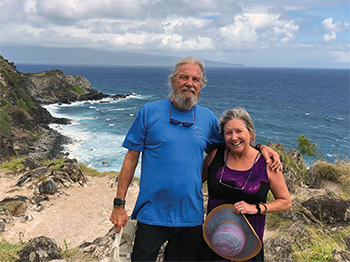Liver Cancer

Hope is Stronger
Greg Schiltz was diagnosed with hepatocellular carcinoma in 2016 and unfortunately passed away in 2020. His goal was to reach his 70th birthday, and he made it by 6 days. Throughout his journey, Greg and his wife, Sarah, chose to celebrate every day. Today, Sarah continues to be involved in the liver cancer community and shares their story to help others whose lives are affected by liver cancer.
Greg had hepatitis C but was asymptomatic for years. Because the side effects of treatment were hard to handle, his primary care physician recommended not treating it. Then a new class of drugs came out, and Greg was intrigued. We found a gastroenterologist who prescribed a new drug that cleared the hepatitis C. However, in a routine follow-up, an ultrasound showed that Greg had hepatocellular carcinoma (HCC).
We began searching for a liver specialist, and though it took more time than we would’ve liked, we were thrilled with her. After reviewing Greg’s case, she felt a liver transplant would give him the best odds. Greg was 67 and otherwise healthy, so he began a tremendous amount of testing to see if he was a candidate. They checked him out top to bottom, all the way to his dental health and mental health. They wanted to make sure he would be a good shepherd for the new liver he could be getting.
Greg was added to the transplant list, and we were told the wait could be long. In the meantime, he had chemoembolization and radiation therapy to help ensure the tumors in his liver didn’t grow out of control, causing him to become ineligible for a transplant.
Greg’s doctor suggested we “multi-list,” which meant not limiting Greg’s transplant possibilities to just the one center. To get on the list at another cancer center, he needed to go through their extensive testing requirements just as he’d done at the first center. We selected a second center across the country that was known for performing frequent liver transplants, and it was that cancer center that called soon after and told us he was number one on the list.
Excited, we moved across the country, taking my sister and her husband with us for support. We soon discovered patience is essential in the transplant world. We got our hopes up four times. The first time, the harvested liver was no good. The second time, the liver was not the right size. The third time, Greg was the backup patient. They always prepped a backup patient in case the primary patient couldn’t take the liver for some reason. However, this liver worked for the primary patient. The fourth time, the liver was too cirrhotic.
During this time, he had a number of chemoembolizations to keep the tumors at bay. Eventually, the tumors grew out of transplant criteria and he was taken off the list. A transplant was no longer an option. Greg was given a prognosis of six months. We went home and started on his bucket list.
But, that six months turned into three and a half years, thanks to a clinical trial testing a novel combination drug therapy and then a newly approved targeted therapy.
We went to Maui a couple of times, and we added to our fur baby family. A lifelong surfer, Greg always wanted a Woody Wagon. He bought a ‘47 Woody that we named Woodrow. Our dream of living on the beach wasn’t practical since we had to be close to medical facilities so instead, we remodeled, giving our home a beachy feel, complete with a whimsical art studio in the backyard where Greg could paint.
Sometimes it was difficult, but I decided I wouldn’t let the fear consume me. I had considered stepping down from work, but the company I work for was very supportive. I was able to work remotely, and it was a healthy distraction. And, truthfully, I think I would have driven Greg crazy if I didn’t have something else to focus on! I found solace in therapy and support groups.
We had a 25-year love story. I wish it would have been more, but I’m grateful for our wonderful friendship and marriage. As an homage to everyone who helped us, I am a mentor through cancer support groups such as Imerman’s Angels, Inspire and Blue Faery. I am a patient advocate for the NCI Task Force for Liver Cancer, with a focus on clinical trials, something that made a big difference in our lives. I’m also on the board of Cancer U, and I give presentations for pharmaceutical companies and cancer agencies such as the American Liver Foundation.
When I share our story, I always offer these insights:
1. Find the right team of doctors and the right cancer center for you. Interview them. Find out what motivates them and where they get their information.
2. You are the captain of this ship. Share your priorities about your preferences for treatments and quality of life.
3. Don’t take for granted that all your doctors and cancer centers communicate with each other. All electronic health records are not integrated.
4. Assemble your support system. You may not know anyone who’s had liver cancer. Seek out online support groups for liver cancer and transplants.
5. Hope is stronger than fear. New treatments are coming. Don’t ever give up.


